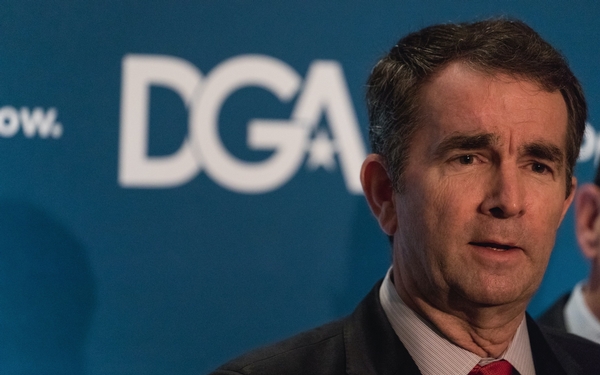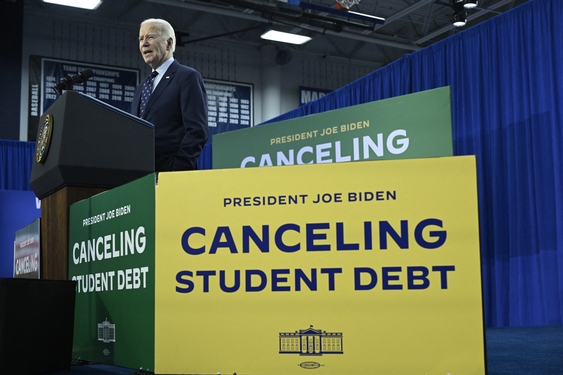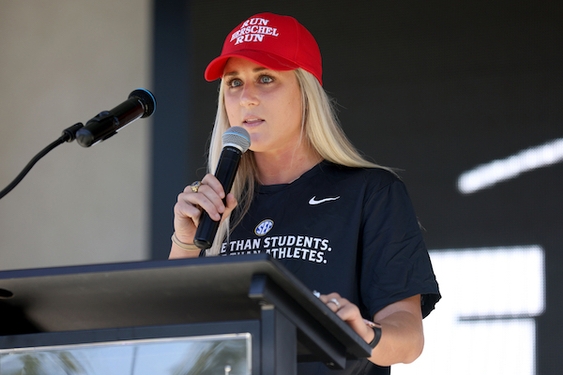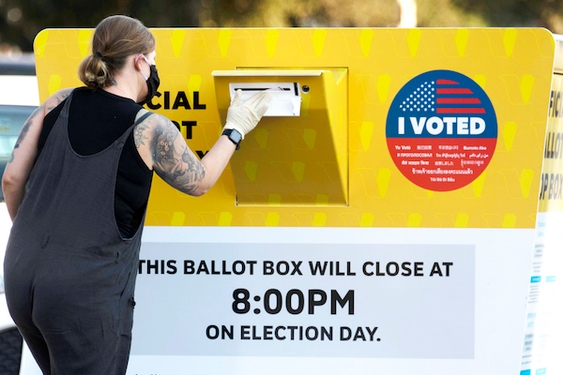The midterm elections are poised to play a pivotal role in whether more states expand Medicaid eligibility, as the number of red state holdouts dwindles.
Governors’ races in states such as Florida and Kansas, along with ballot initiatives in Idaho, Nebraska and Utah, are being watched closely by Medicaid experts this year.
The first half of 2018 already marks a monumental shift in Medicaid, the government insurance program for low-income Americans. And we could see the largest number of states in years adopt Medicaid expansion after this fall’s elections. But unprecedented changes to the program — namely, work requirements — are also beginning to take effect in some states that could shift the program in the other direction and scale back its population.
The expansion of Medicaid in Virginia is giving advocates hope. Democratic Gov. Ralph Northam on Thursday signed a state budget that includes extending Medicaid coverage to about 400,000 people. The move comes after years of expansion efforts by Democrats, who achieved significant gains in the state legislature last year with health care as a key campaign issue.
The case of Virginia, where the 2017 legislative elections trimmed the Republicans’ statehouse majority to a razor-thin margin, shows how electoral changes may lead other states to expand eventually, said Ben Sommers, associate professor of health policy and economics at Harvard.
“The implications for the midterm elections nationally are clear,” Sommers said. “In states that have yet to expand, if there is a large influx of new legislators and/or governors supportive of expansion, we’ll probably see some other states follow suit.”
Experts say the recent developments are fueled, in part, by greater certainty of continued federal support for Medicaid, following last year’s unsuccessful Republican efforts to repeal and replace the 2010 health care law. Medicaid expansion also established itself as an issue voters are more aware of and that many support, they say.
“After a year or two in limbo without much movement, the state debate over Medicaid expansion is back in full swing,” Sommers said.
Kansas is one state to watch. Earlier this year, GOP Gov. Sam Brownback, who stood in the way of expansion despite support for it in the legislature, left to become ambassador-at-large for international religious freedom. A crowded field of candidates is vying for the governorship.
“Kansas’ state legislature already passed Medicaid expansion only to fall just short of overriding the governor’s veto, so the election there will be critical to determining Medicaid’s fate,” Sommers said.
Another is Florida, where several Democratic and Republican candidates are competing in the Aug. 28 gubernatorial primaries. Among the Democrats supporting expansion are former Rep. Gwen Graham and former Miami Beach Mayor Philip Levine. The Republicans who oppose broadening the program include Rep. Ron DeSantis and former Rep. Adam H. Putnam, now the state’s agriculture commissioner. Graham mentioned Medicaid expansion in a 30-second TV ad released last week.
Nationwide, 33 states and the District of Columbia opted to expand the program under the health care law.
Last fall, Maine became the first state to adopt expansion via a ballot referendum, which garnered nearly 60 percent voter approval. The state’s Republican Gov. Paul R. LePage, a staunch expansion opponent, refused to implement it, but last week, a Maine superior court judge ruled the state must comply with the law and move forward.
Advocates in Idaho, Utah and Nebraska pursuing ballot measures are optimistic. Expansion would extend health coverage to more than 300,000 people in those states. Meanwhile, in Montana, supporters are also focused on renewing its expansion, which covers nearly 100,000 people and is set to expire next year.
In Utah, volunteers have already gathered enough signatures to have the expansion question put on the ballot. It also seems likely in Idaho, though the signatures turned in to the state in April must still be officially certified. Signature collection in Nebraska and Montana appears on track, according to the Fairness Project, an advocacy group championing expansion ballot initiatives.
“What we’re seeing play out are attempts at the state level to stabilize some of the chaos that’s been created out of Washington, D.C.,” said Jonathan Schleifer, the group’s executive director. “Americans want more health care, not less.”
Schleifer said he’s hearing from advocates in more states interested in pursuing similar ballot initiatives in 2020, though he wouldn’t specify which ones.
Medicaid expansion will be a defining factor for voters this fall, whether through voting for ballot initiatives, state legislators or gubernatorial candidates, Schleifer predicted.
Experts point to several reasons why.
The “coverage gap,” where some people make too much money to qualify for Medicaid but too little to get subsidies on the health care law’s insurances exchanges, hasn’t gone away, said Cindy Mann, an expert with consulting firm Manatt who ran Medicaid during the Obama administration.
“As years go by, in states with large numbers of residents in the gap, it becomes increasingly untenable to leave federal dollars on the table that could cover most of the cost of the coverage,” she said.
Under the health care law’s expansion, the federal government promised to cover 93 percent of the cost of new enrollees next year, with support phasing down to 90 percent in 2020 and beyond.
The Trump administration’s embrace of Medicaid work requirements may also prompt more red states to revisit the expansion question. Virginia’s Medicaid expansion vote was accompanied by a work requirement plan.
It’s a conservative idea that makes expansion more politically palatable, experts say.
“Work requirements facilitate expansion as a political compromise and as a fig leaf for some Republicans to change their positions,” said Paul Ginsburg, a health policy expert at the liberal-leaning Brookings Institution.
The Centers for Medicare and Medicaid Services has so far this year approved work requirements in four states — Kentucky, Arkansas, Indiana and New Hampshire.
Arkansas became the first state to institute its work mandate on June 1, while Kentucky plans to begin rolling the program out in phases later this summer.
Conservatives tout the idea as a way to lift people out of poverty, while critics warn people with disabilities and other vulnerable groups will be unfairly kicked off Medicaid as a result.
Several consumer advocacy groups are challenging the Trump administration in court over the issue, arguing the federal government doesn’t have the authority to allow states to make such an unprecedented change to Medicaid. They filed a class action lawsuit in January aimed at stopping the Kentucky requirements, with its first hearing scheduled for June 15 in federal court.
Some Republicans have expressed skepticism of the work requirements concept.
Speaking with reporters last week, Sen. Bill Cassidy said he is personally pessimistic that Medicaid work requirements will be beneficial, noting that people can always go to the emergency room whether or not they have health coverage.
“With that said, I’m a big believer in federalism and some things that seem sure to work don’t, and some things that seem maybe not so good turn out very well,” the Louisiana Republican said. “So, as a believer in federalism, I’m willing to see what happens.”
He also discussed challenges with Medicaid expansion in his home state, where coverage was extended to about 450,000 people.
People have access to doctors, but that’s typically primary care with limited opportunities for specialty care, he said. Cassidy noted his state faces a budget crisis, even before 2020 when he said Louisiana’s share of expansion will be $310 million.
Health policy experts note, however, that expansion has brought states billions of dollars in new federal funding and produced savings in other areas of the health care system. For instance, states can use federal money — instead of strictly state dollars — to help pay for mental health services under expansion. Hospitals have also seen uncompensated care costs drop, as the number of people with insurance rose.
“With the passage of time, there is more and more evidence that expansions have resulted in historic and sustainable drops in uninsurance, sharp reductions in uncompensated care, state budget and overall economic gains, and generally good access to care and satisfaction levels,” Mann said. “Gubernatorial and state legislative elections in 2018 might add momentum to the expansion debate.”
———
(Mary Ellen McIntire contributed to this report.)
———
©2018 CQ-Roll Call, Inc., All Rights Reserved
Visit CQ Roll Call at www.rollcall.com
Distributed by Tribune Content Agency, LLC.












